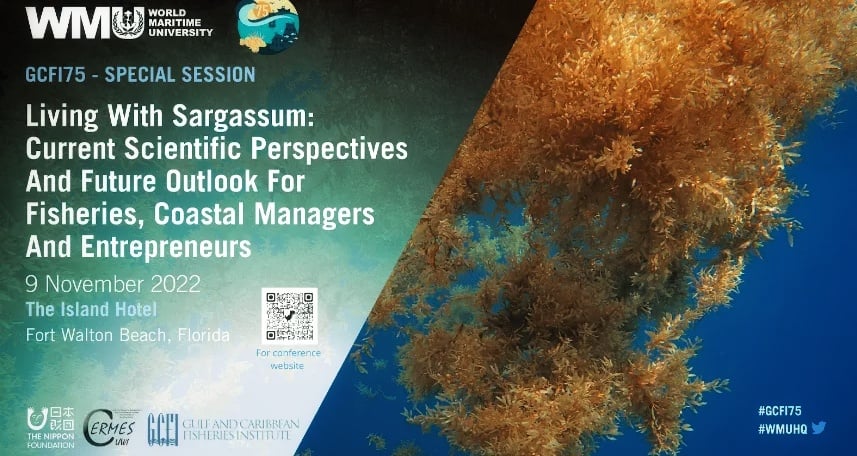The World Maritime University’s (WMU) Closing the Circle Programme delivered a special session on sargassum at the 75th Annual Conference of the Gulf and Caribbean Fisheries Institute that took place from 7-11 November 2022 in Fort Walton-Destin in Florida, USA.
The conference covered a wide range of regional fisheries and marine management topics with 140 delegates from across the Caribbean, Central and North America in attendance and many more following the proceedings online.
Adapting to changing oceans was a key theme and included a special session entitled “Living With Sargassum: Current Scientific Perspectives And Future Outlook
For Fisheries, Coastal Managers And Entrepreneurs” organized by the WMU-Sasakawa Global Ocean Institute (GOI) together with CERMES from the University of the West Indies, Barbados.
The special session was sponsored by The Nippon Foundation’s generous funding as part of the GOI’s flagship research programme “Closing the Circle: Marine Debris, Sargassum and Marine Spatial Planning” for which the threat of Sargassum is a core research theme.
Co-convened by WMU Professor Francis Neat and CERMES Professor Hazel Oxenford, the aim of the session was to bring together leading experts on Sargassum and present state of the art research from an interdisciplinary perspective.
The special session opened with a keynote address by Dr Shelly Ann Cox on the “Transatlantic Triple Threat” that provided a comprehensive account of the recent inundations of Sargassum to the region, why it is happening and what its means for the coastal stakeholders. Rather than focusing on the negative impacts,
Dr Cox highlighted the solutions to the problem, in particular efforts currently underway to transform the problem into a business opportunity.
Kristie Alleyene, PhD candidate under the NF-WMU Closing the Circle Programme, presented her research findings on the oceanic origins of Sargassum influxes to Barbados and how this relates to the associated biodiversity.
Additional presentations focused on topics such as rates of Sargassum growth, contamination with microplastics, validation of predictive models using citizen science photographs and socioeconomic impacts and responses to Sargassum. Case studies were presented from Bonaire, St Lucia and Barbados.
The session was very well attended and received both onsite as well as online, leading to extensive questions and discussions. Conclusions included that:
- Sargassum continues to inundate the Caribbean region with 2022 being the worst year to date in terms of volume.
- Authorities are now better placed to deal with and clean up Sargassum, but there remain concerns with what can be done with Sargassum because of contamination with plastic and heavy metals. Research is needed to evaluate the environmental and human health risks of using and disposing of contaminated Sargassum.
- Social studies of the impact of Sargassum are revealing psychological and health impacts on coastal communities, further highlighting the need to effectively counteract the problem.
- We are now understanding much more about the biodiversity and origins of the Sargassum that can help plan for how best to design management interventions.
- Forecasting the influx events is becoming increasingly accurate, notably the modeling advances that combine satellite based imagery with local wind models. This helps authorities plan ahead and anticipate stranding events.
- State of the art thinking for mitigation includes sinking the Sargassum offshore in the deep ocean before it has a chance to make landfall. This is interesting because of carbon capture potential, although impacts to the deep-sea are unknown.
The Special session may be viewed via GCFI recording here.
About the Closing the Circle Programme
The WMU-Sasakawa Global Ocean Institute is, with the generous support of The Nippon Foundation, hosting the “Closing the Circle” Programme: Marine Debris, Sargassum and Marine Spatial Planning.
The programme team consists of the Project PIs, a Research Fellow and 4 PhD candidates who research on respective projects to explore challenges and advancing potential solutions to marine debris, sargassum threats and marine spatial planning (MSP) in Small Island Developing States (SIDS) with a particular focus on the Eastern Caribbean region. Eastern Caribbean region has recently faced a mounting problem from vast beach strandings of the normally oceanic seaweed Sargassum.
The combination of marine debris and Sargassum seaweed has resulted in an untold ecological impact and socioeconomic hardship for these SIDS that are highly dependent on tourism.
Marine spatial planning (MSP) has emerged as a new approach to holistically plan and manage ocean space and resources. Learn more about the programme here.
















